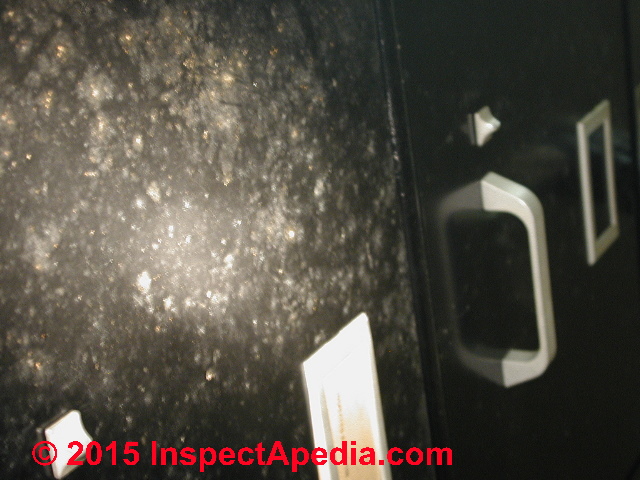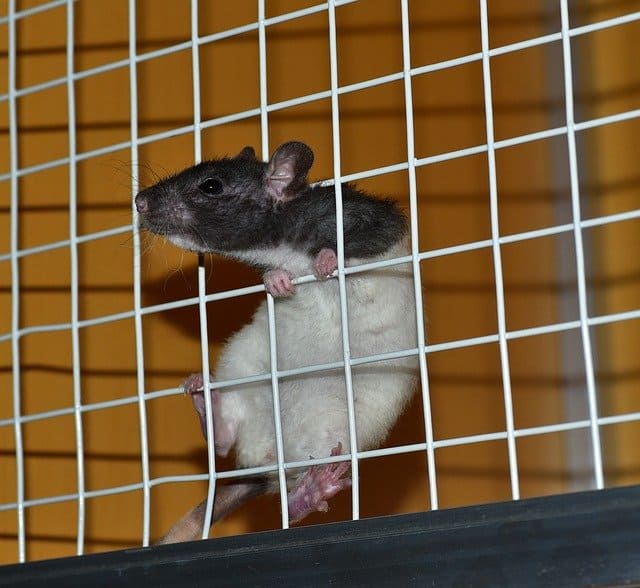On aluminum sills the mold around windows causes dust to settle and combines with moisture creating the perfect environment for mold. Homeowners should have enough ventilation so the air and light can minimize the chance of mold exposure.
 Photographic Guide To Mold On Plastic Or Rubber Garden Hose Mold On Glass Surfaces Such As Window Panes Mold On Hardboard Used Indoors Mold On Houseplants Mold On Insulating Boards And Sheathing
Photographic Guide To Mold On Plastic Or Rubber Garden Hose Mold On Glass Surfaces Such As Window Panes Mold On Hardboard Used Indoors Mold On Houseplants Mold On Insulating Boards And Sheathing
Warmth since mold cant grow in freezing temperatures.

Can mold grow on metal. So can mold grow on metal buildings. An poorly ventilated attic can become a prime host in a house with no interior air barrier allowing moist warm air to migrate into the attic. Allowing mold to continue to grow under your siding can have a number of consequences.
Fungus and bacteria are a part of this world for countless years now. Mostly the fungus will grow rapidly on furniture that damaged by the water and develops on non-porous surfaces like ceilings toilets bathroom wall and tile floors. A food source such as wood or drywall.
How does mold grow on metal. However if the flashing is broke or not properly attached water can seep behind the siding allowing mold to grow. Can Mold Grow on Metal.
Mold grows on the walls near water while rust is red and grows on metal. Hence there are multiple things you need to take care of to avoid mold from occupying metal surfaces anywhere. Step 1 Protect yourself before cleaning up the mold.
What Causes Mold to Grow in a Home. Mold is a naturally occurring fungus that exists everywhere proliferating in areas containing significant moisture. By Mold Homes November 13 2019.
Mold on metal can grow due to a wide range of reasons that are discussed below for you. For mold to grow in a home it needs the following conditions. Wet cellulose materials including paper and paper products cardboard ceiling tiles wood and wood products are particularly conducive for the growth of some molds.
Mold and mildew grow on windows when condensation collects on the inside of windows and drips down the pane. As we stated above mold on metal does not grow due to one but a variety of reasons. If you have mold on your aluminum windows you should take the following steps to remove it as soon as possible.
For example did you know that mold can be red in color and grow on metal as well. Darkness since mold cant grow in ultraviolet light. Mold is unable to digest inorganic materials such as concrete glass and metal but it can digest and grow on the dirt dust and organic residue that accumulates on them.
Various species of mold will grow on the organic component of dust and debris that is deposited on the interior of h v a c ducts. You still need the spores to start it though. Eso The photo is a bit blurry so Im not certain but that looks as if it could be some mold growing inside your metal ductwork.
The mold uses the organic matter present in household dust for sustenance. While this is a good guess it does not always turn out to be true. Mold feeds on organic materials such as wood paper and certain types of glue.
To grow mold one needs moisture heat limited oxygen and of course spores. Mold grows on and digests some synthetic materials like paints adhesives and textiles as well. Under the right conditions though mold can also grow on semi-porous and nonporous materials like glass metal and also plastic.
Steel framing helps prevent mold in three ways. Why Does Mold Grow on Metal. Mold can also adversely affect the health of certain susceptible individuals including those with a suppressed immune system or an allergy to mold.
On 2020-06-02 by mod - mold growth on organic debris dust in metal ductwork. You are likely to see mold grow on the north side of your roof and siding. Other materials such as dust paints wallpaper insulation materials drywall carpet fabric and upholstery commonly support mold.
First of all the framing itself is inorganic so mold cant feed on steel like it does. First it can have a major impact on your homes structure and integrity. Its important to catch the signs of indoor mold growth as early as possible and have them taken care of before they lead to greater damage.
Mold can grow as the result of a single event such as a broken pipe or indoor water infiltration due to floods or leaks. One of the many misconceptions regarding the matter is that it is only limited to specific surfaces. Dirt or mineral accumulations however provide a perfect habitat for mold growth.
Fortunately since metal is not porous removing mold from metal is not difficult and metal items can usually be salvaged even after a flood. Exposure to blue mold on wall and wood can cause several health problems. While mold requires the presence of organic matter and humidity to grow it can be found on both wood and aluminum window sills.
Dont use abrasive cleansers that can scratch the stainless steel. Mold spores thrive on porous surfaces -- thats why clean stainless steel isnt a conducive environment for mold development. The short answer is no.
Mold is a foul-smelling and potentially dangerous fungus most commonly associated with porous materials like wood plaster grout and fabrics. Mold is a common problem anywhere conditions warmth and moisture are sufficient for its growth. Many building materials provide suitable nutrients that encourage mold to grow.
The speed at which mold grows on plastic depends on multiple factors. Mold grows on many surfaces including metal. Mold on Metal Surfaces Stainless Steel sink Mold on Steel Lally Column Its less surprising to find mold growth on a stainless steel surface if you consider that the surface may have had a film coating of food or other organic material.


